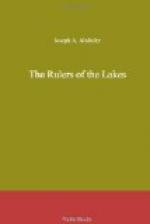It was almost the middle of the morning when Willet gave the word to renew the march, and they soon saw they had extreme need of caution. Evidence that warriors had passed was all about them. Now and then they saw the faint imprint of a moccasin. Twice they found little painted feathers that had fallen from a headdress or a scalplock, and once Tayoga saw a red bead lying in the grass where it had dropped, perhaps, from a legging.
“We shall have to pass by Tandakora’s band and perhaps other bands in the night,” said Tayoga.
“It’s possible, too,” said Willet, “that they know we’re on our way to the fort, and may try to stop us. Our critical time will soon be at hand.”
They listened throughout the afternoon for the signals that bands might make to one another, but heard nothing. Willet, in truth, was not surprised.
“Silence will serve them best,” he said, “and they’ll send runners from band to band. Still, if they do give signals we want to know it.”
“There is a river, narrow but deep, about five miles ahead,” said Tayoga, “and we’ll have to cross it on our way to the fort. I think it is there that Tandakora will await us.”
“It’s pretty sure to be the place,” said Willet. “Do you know where there’s a ford, Tayoga?”
“There is none.”
“Then we’ll have to swim for it. That’s bad. But you say it’s a narrow stream?”
“Yes, Great Bear. Two minutes would carry us across it.”
“Then we must find some place for the fording where the trees lean over from either side and the shadow is deep.”
Tayoga nodded, and, after that, they advanced in silence, redoubling their caution as they drew near to the river. The night was not so bright as the one that had just gone before, but it furnished sufficient light for wary and watching warriors to see their figures at a considerable distance, and, now and then, they stopped to search the thickets with their own eyes. No wind blew, their footsteps made no sound and the intense stillness of the forest wove itself into the texture of Robert’s mind. His extraordinary fancy peopled it with phantoms. There was a warrior in every bush, but, secure in the comradeship of his two great friends, he went on without fear.
“There is no signal,” whispered Tayoga at last. “They do not even imitate the cry of bird or beast, and it proves one thing, Great Bear.”
“So it does, Tayoga.”
“You know as well as I do, Great Bear, that they make no sound because they have set the trap, and they do not wish to alarm the game which they expect to walk into it.”
“Even so, Tayoga. Our minds travel in the same channel.”
“But the game is suspicious, nevertheless,” continued Tayoga in his precise school English, “and the trap will not fall.”
“No, Tayoga, it won’t fall, because the game won’t walk into it.”
“Tandakora will suffer great disappointment. He is a mighty hunter and he has hunted mighty game, but the game that he hunts now is more wary than the stag or the bear, and has greater power to strike back than either.”




